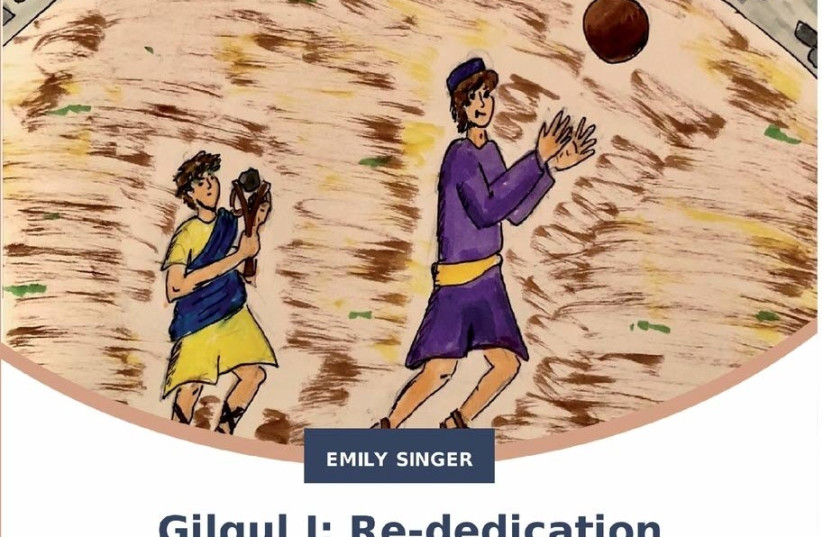David is a teenage boy who would rather be outside playing ball than sitting for long hours next to his father in religious services. Even when the temple that David’s family belongs to is not just any synagogue, but THE TEMPLE, the majestic Holy Temple in Jerusalem, the Beit Hamikdash.
The date is the tenth of the Jewish month of Tishrei. It is Yom Kippur and David is spending the whole day with his father in Temple. It is his first year as a Jewish adult as he just celebrated his 13th birthday on Rosh Hashanah, and this means he is obligated to fast the whole day. David knows it will not be easy, especially because he has to watch the priests perform the sacrifices that are part of the services and he has a history of vomiting when he sees innocent animals being slaughtered. David is a good kid and regularly accompanies his father to the Temple, but he still does not really understand why God would even want animal sacrifices. As David says in the first line of Chapter One, “I was born in the wrong century.”
David is living in the 145th year of the Kingdom of the Greeks. He lives in a one-room house with his parents, who he calls Ima and Abba, and his sister Lea, a smart and spunky girl two years older and a full cubit taller. His Abba is a master carpenter and the greatest Torah scholar in Jerusalem. He teaches Torah to David and Lea and many other children in the city. David and Lea also help their father in his carpentry workshop where he makes beautiful furniture, mostly for the king.
Five days after David’s first Yom Kippur as a man, on the morning of the Sukkot holiday, the Greeks take over the Holy Temple. They defile the altars by sacrificing pigs and violently attack countless Jews. Two years later, when David is 15, the Greeks are still controlling the city and the Holy Temple. Jerusalem’s Jews have no choice but to pray to God without the sacrifices that were a regular part of Jewish worship. They are forced to observe the holidays without the Temple. When in the past thousands of Jewish pilgrims came to Jerusalem from around the world, they no longer come.
David and his family still celebrate the holidays the best they can, but it is not the same. The fun and festivities have disappeared.
Meanwhile, David’s passion is “Skyros”, a ball game like no other. Skyros resembles football in some ways, but depending on who is playing, it can be a particularly violent game. This is something David does not know at the beginning of his Skyros career but learns soon enough. He plays Skyros with a group of Hellenized Jews, boys whose families act like Greeks and do not follow the Jewish laws and traditions. David is not Hellenized, his family keeps all the Jewish laws, and he just likes to play Skyros. Actually, he is the best player on the team. Still, he knows his father does not approve of him playing Skyros, so he tries to hide it from him.
In this creative and fast-paced book intended for a middle-school audience, author Emily Singer takes the reader back to ancient times and tells an exciting tale that will have its readers looking at the Hanukkah story in a different way. David, his friends and his sister are really just regular kids, despite the fact that they live in the times of animal sacrifices and terrible Greek kings. The story is filled with action and adventure and gives the readers a lesson in Jewish history at the same time.

When in a strange twist, David is invited to join the Greek Skyros team and play in the “Greek Games” he gets to know some of his Greek teammates and even makes a good friend. While the Greek team’s form of Skyros is violent and rules are non-existent, David does not give up, and when he is injured he uses a special kind of magic to heal himself and his teammates’ injuries too.
For kids who love action, intrigue, and a little Harry Potter-style magic thrown in for good measure, this book is highly recommended. In Gilgul, Jewish history comes alive in a way to which kids can relate. The historical background of the book was clearly well researched and the fictional characters come to life on the pages. In her notes at the end, the author mentions that the real characters of King Antiochus and Judah Maccabee, both of whom appear in the story, are loosely based on historical references.
Gilgul I: Re-dedication is a page-turner.
I give Singer a lot of credit for her fruitful imagination, as it is not easy to make this period in history entertaining for kids. The book is intended as the first in a series. If you want to know why the book is called “Gilgul”, which refers to the concept of gilgul neshamot, or reincarnation, you will have to read it to find out.
